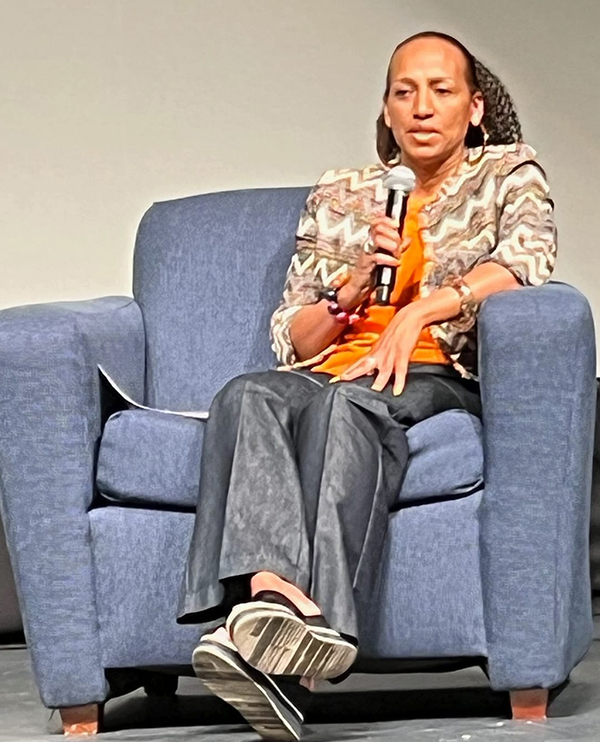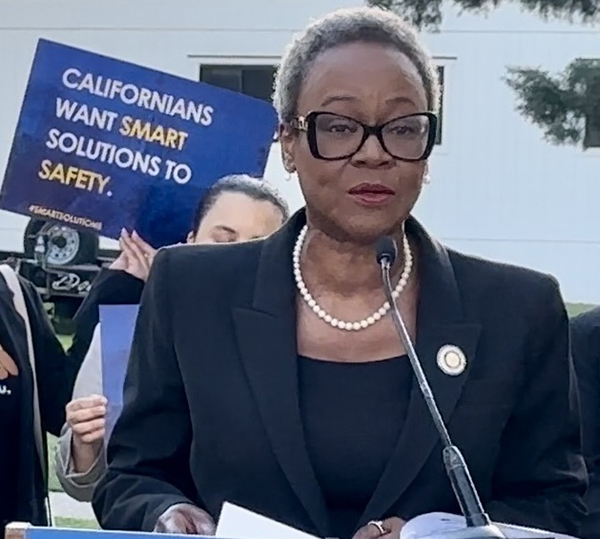By Charlene Muhammad
Contributing Writer
April Valentine, 31, planned to celebrate her infant’s birth with family and friends, but instead her loved ones found themselves outside Centinela Hospital in Inglewood, protesting Valentine’s death.
Valentine’s family alleges she complained about leg pain for hours while in labor Jan. 10, but, pregnant with her first child, she died that day.
Valentine’s plight is only one episode, advocates say, in an escalating crisis affecting Black women during pregnancy throughout California and across the country. A group of advocates is collaborating to bring awareness to the Black maternal and infant health crisis, recently screening the film “Birthing Justice: Every Woman Deserves a Beautiful Birth Story” at The Miracle Theater in Inglewood. A panel discussion accompanied the feature-length documentary.
“Birthing Justice” covers the issues underpinning the maternal health crisis within the African-American community and discusses best practices to enhance birthing equity.
The film’s audience completed a preliminary survey online, followed by a post-screening survey.
“We probably will end up having a hundred screenings and we want to share with legislators, policymakers, with health care institutions the lived experience of people who are coming into the screenings, so they actually have the real data and we can use that to make the case for some of the actions we want to see happen,” said Denise Pines, the film’s executive producer and co-founder of Women in the Room Productions.
The event was sponsored by African American Infant/Maternal Mortality, Girls Club-Los Angeles, Southern Christian Leadership Conference-Southern California, Charles Drew University, Black Maternal Health Center of Excellence, Children’s Institute and Black Women for Wellness.
Pines recommended supporting and volunteering with organizations that perform much-needed work to address pregnancy-related deaths of Black mothers and babies.
The filmmakers explored what they are calling a “national epidemic” prominent in Washington, D.C., Augusta, Georgia. and several areas of Missouri and California. Among those interviewed were women impacted by current policies — birthing moms and health care professionals, birthing advocates, activists and policymakers at the forefront of advancing change.
Black women are three times more likely than white women to die from a pregnancy-related cause, according to the Centers for Disease Control and Prevention. Multiple factors contribute to these disparities, such as variations in health care, underlying chronic conditions, structural racism and implicit biases.
“Birthing Justice” stressed that high mortality rates among Black women are not due to their genetic makeup, what they ate, how they behaved or other lifestyle habits. Compared to poor white women with less education Black women had higher death rates.
Women in the Room Productions has partnered with the National Birth Equity Collaborative, one of the leading policy organizations in the country, to support legislation and public education including the Black Maternal Health Momnibus Act of 2021. The act is comprised of 12 bills addressing various dimensions of the Black maternal health crisis. Democrat and U.S. Rep. Lauren Underwood appears in the film.
Rev. Thembekila Smart, executive director of the Women of Southern Christian Leadership Conference, Southern California Chapter, moderated the four-person panel in Inglewood. She described the current state of Black maternal health in the United States as “medical apartheid.”
During their discussion the panelists amplified the main themes of “Birthing Justice” as they made the case that encouragement, resources, and support are necessary, along with improved medical care, to transform the maternal care system.
Dr. LaTanya Hines, an obstetrician and member of the Association of Black Women’s Physicians, described herself as an unapologetic, proud advocate for Black women.
“Nobody should die in pregnancy,” she said.
Hines addressed the importance of women’s health care, stressing the need to start conversations with patients about planning their pregnancies. Vital statistics are also critical, making sure blood pressure, blood sugar and weight were well-controlled before pregnancy, Hines added.
“I am going to work with you and we will have a shared decision-making plan,” Hines said.
Debbie Allen, founder of Tribe Midwifery, said women should not assume medical establishments will give them the care they are supposed to receive.
“Demand it,” she said. “There are so many layers as to why we get the care that we get, but until those things change, we have to take responsibility to make sure we get the care we deserve.”
Allen said women should ask questions, involve their partners, and treat childbirth like planning a wedding.
Leigh Purry, senior manager of community health at Blue Shield of California’s Health Transformation Lab, supported the documentary’s message.
“This film will shine light on the critical issue of saving lives and this film will help ensure that every pregnant and birthing person’s voice is heard,” Purry said.
“This film will help ensure that people have access and receive all the support they need to feel safe and cared for,” she added. “Racism exists and it exists in health care.”
For more information about the movement to ensure birthing justice for Black mothers and their families, and to find a film screening in your area, visit BirthingJustice.com.
Charlene Muhammad is a reporter for California Black Media.











